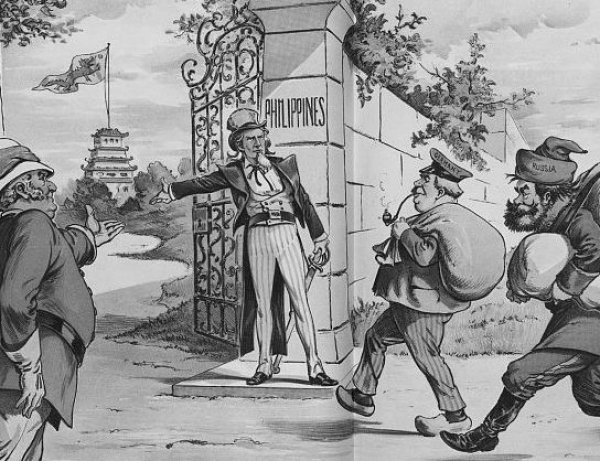polcies toward Islam, this unnamed American takes aim
at England in India. TNT has split this India portion into
two parts.//
1914 Map
Atrocities
in India
The former
chief of the American Cabinet, Mr. William Jenks
(ed.note: name as transcribed from Ottoman Turkish), made
these notes about
English atrocities in India in his travel log:
“Above the
door of the courthouse in Elbagir in India, there is
a sign which reads 'The
Pillar of the English Government is
Justice'".
When I read this I was reminded of Jenks’s words:
“Even if you praise
your courts up to the sky, as long as basic
justice is not administered then the
slap of a woman will bring
them down.”
"After the
American government seized Manila it decided to
follow a colonial policy. In this regard, it seemed to me to be
worthwhile to examine England’s method of administration in
India because
England’s colonial policy is held in high esteem
throughout America. So I got in contact with a number of
high-ranking
English civil servants. I also met with
educated
Indian Hindus, Moslems and Parsis.
I looked into the lives of
both the wealthy and the poor, relevant
statistics and various
speeches and reports that I could never find in
America. As a
result, I came to the
conclusion that the English
administration in India is more oppresive than I
had previously
thought."

Lordly Administrators
Another
article in the aforementioned Mr. William Jenks’s
travel log caught my
attention: “I met with Lord Minto , as
well as with the Bengal and Bombay governors.
England
acquired India for its own interests, not for those of the
Indians.
Of course, the laws and the administration are intended for the
benefit of the English and certainly every matter is adjudicated
as if the
judge was deciding on his own personal case.
All of
the civil servants in India are English. The central government
there represents the English nation, not the Indian nation.
These
civil servants come and go to and from England for
specific periods and they look at all matters from an English
perspective rather than from an Indian
one. Of course, they are
not as
knowledgeable about the needs of the populace as are
those who deal with the
people each day are."
Even the
English Condemn England
During the
war in South Africa, it was the English themselves
who criticized England most
vociferously for the oppression
inflicted on the Moslems there. Today, there are many in
England who are
critical of the English administration in India.
An Indian
named Nayirobi (ed. note: as transcribed from
Ottoman Turkish) went to England and had a 3-paragraph letter
he prepared
accepted by one of the free-choice societies there
about the oppression that
the Indians are suffering. Here are the
three paragraphs:
"England
unjustly occupied India in order to have an endless
treasure for itself. It is
administering a sultanate there with
billions spent from India’s national wealth."
"Every year
England steals 30 million sterling from India’s
national wealth. For this reason
a great portion of the people
are poor and needy. England has a debt to
address the causes
and find solutions for the misery that drought and famine
cause
and must make the necessary related expenditures."
"Is it
becoming to England that donations have to be sought
from other nations to fill the
stomachs and treat the illnesses
of Indian citizens enslaved under a 150-year
administration
that cast a stain on Englishness?"

Official Duping and False Promises
Again, the
aforementioned William Jenks stated that: “Queen
Victoria issued a statement in
the aftermath of the Indian
uprising of 1857, to the effect that Indians of
honor and with
education would be appointed to civil service positions with
an
eye toward independence. But Lord Lytton,
a viceroy in
India, stated this in his recently-published confidential notes
with regard to this matter, in particular, that:
‘We all know that
this request and hope of the Indians will never come
to pass.
We would never accept the
Indians into the regular civil service.
We would choose the less-qualified second-place candidate by
duping and
distracting the Indian candidate.'"
"In
another note, Lord Lytton wrote that ‘Here in this
confidential note that I
write, I have no hesitation in confessing
that the English and Indian
governments did not stand by their
promises and they have still not be absolved
of this stain.’" !?
Despotism
The people
of India have no say with regard to the taxes they
pay and the expenditure of
this tax revenue. Out of $250
million
collected annually (56,500,000 Ottoman liras) in taxes
some $100 million
(33,500,000 Ottoman liras) are spent on the
Indian army but an Indian cannot be
an officer in this army. A
total of $100
million (33,500,000 Ottoman liras), which is the
equivalent of the general
expenses of the Indian government,
is
sent to England each year and this is
about half of the
general tax revenue collected. Another $15 million
(3,400,000 Ottoman liras)
is allocated for foreign officials in
India.
One wonders what other nation on Earth could bear this
kind of a loss of
its national wealth?
//END of PART III-A//

Hiç yorum yok:
Yorum Gönder